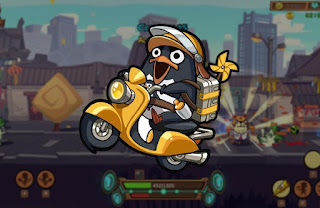Rhythm Fighter suffers from excess. In trying to be so many mechanical and structural elments, and then backing it up with so much happening on screen at once, it loses any sense of balance that it might otherwise have had. While it’s a noble and even admirable attempt, it is also so over the top with everything that it’s exhausting to play. I’m sad to say I didn’t enjoy this game anywhere near as much as I probably wanted to.
Rhythm Fighter is a side-scrolling brawler roguelike rhythm game. No, really. It’s all of that, and it’s every bit as messy as it sounds. You move from one randomly-generated stage to another, within randomly-generated levels, defeating hordes of enemies (and the occasional end-boss), while picking up a whirlwind of items and powers. Oh, and you have to do all of that within a specific beat that thuds on incessantly in the background. Now, there’s no reason that rhythm/action games can’t work – I immediately think of the wonderfully elegant systems of Patapon and the way it deftly merged real-time combat with rhythm action, but Patapon was also simple and elegant in design, while Rhythm Fighter is an absolute mess.
Because the game sets itself a very specific beat to make the combat exciting, and that rhythm keeps assaulting your eardrums between battles, you’re constantly being stressed into making quick decisions, which doesn’t gel well with the need to read item descriptions and decide what to purchase from vendors. Rhythm Fighter is also meant to be comedic in tone – you play as animals resisting waves of enemy vegetables, after all – but because of the frenetic pace, it’s impossible to focus on the humour and most of it is lost under all the activity. That pace also means that there’s very little tactical variety in the game. The first time you run into an enemy they’ll likely get a shot or two in because you’re just not expecting what they offer. After that though, enemies can’t have complex attack patterns and work in the context of a rhythm game, so they don’t, and understanding how to deal with those enemy patterns doesn’t require much memorisation or practice at all.

Rhythm Fighter’s other really big problem is the control scheme, with dedicated buttons to turn to face left or right, separate to the buttons to move and to attack. In the heat of battle, with enemies coming in each which way or a boss rapidly shifting from moving left to right to right to left, and the fact that you need to do all of this in time with a very specific rhythm, the control scheme was unwieldy enough that I did make mistakes even after a few run throughs, and in the context of a roguelike, those mistakes often became very costly.
For all the above there is a heart and soul in Rhythm Fighter that makes it easy to forgive. It’s not a cruelly-difficult roguelike, and you’ll keep some progression even when, after a failed “run” you’re dropped back at the start of the first stage. The amount of activity that occurs on-screen is almost overwhelming, but it’s bright and colourful and full of a positive kind of energy. And that soundtrack is not the kind of thing I’d ever listen to away from the game, but in the context of the action it’s effective in getting the blood pumping.
The reward systems are also nice, with a steady drip-feed of new characters and items to mess around with that will help to keep you interested. As with any roguelike, Rhythm Fighter wants to test your patience for repetition in re-treading old ground in exchange for the satisfaction of making progress. Without much of a narrative, the rewards come from the opportunity to see new environments and hear new music, and while I have played roguelikes that offer better rewards than that, I’d be lying if I said I didn’t greatly enjoy defeating bosses or uncovering the occasional secret as I explored.

Bringing together so many mechanical elements to the scope and vision of Rhythm Fighter required a much more visionary developer than the one that produced the game. That’s not to say it isn’t entertaining, and there is a lot to enjoy with the game, however, it is also true that the overall experience is messy and the team lost control over what they were trying to achieve, making for something far too clumsy and clunky for the kind of precision that it needed.
Editor-in-Chief
Find me on Twitter: @mattsainsb








